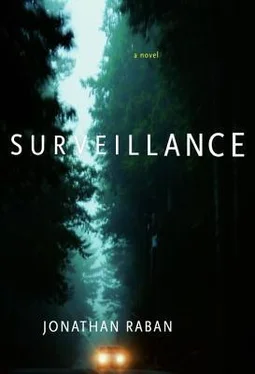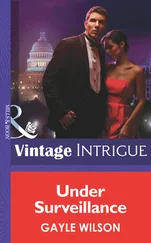The sea had disappeared completely. No wonder they’d called the place Useless Bay — low tide revealed it as all sand. The magnified sun stood right over the jagged, deckle-edged Olympics; it was going to be one of those butcher-shop sunsets.
“Wine would be nice — red, if you have it.”
Getting up from his chair to take her empty martini glass, Augie said, “There’s no conversation more boring than the one where everyone agrees.”
Emboldened by gin, Lucy said, “Montaigne.”
“Oh, smart-ass,” Augie said and walked chuckling into the house.

RATHER TOO MUCH deliberation had gone into the choice of books that filled the small bookshelf on the dresser in Lucy’s room: Emerson’s Self-Reliance and Other Essays, Mencken’s Prejudices, The Devil’s Dictionary by Ambrose Bierce. Looking over the titles, Lucy thought they looked less like bedtime reading than a bedtime reading list. Augie’s politics were signaled by George F. Will, the only living author on the shelf.
Everyone except Lucy had gone to bed early. At ten, as they parted company on the landing, Augie had said to her, “‘Good night, America…and to all the ships at sea’”—another of his compulsive quotations, though she couldn’t fathom why Walter Winchell had to be dragged into it.
She considered going downstairs to fetch herself another glass of wine, but even in this millionaire mansion, the walls were thin and every sound carried; she’d heard the murmur of voices from Minna and Augie’s room, and didn’t want to be fingered as a solitary late-night drinker.
Thinking of Augie’s quotes made her remember that one of her dad’s favorites was from Ambrose Bierce: “War is God’s way of teaching Americans geography.” She pulled out The Devil’s Dictionary and looked it up. Disappointingly, the long entry under “War” didn’t have those words or any that remotely resembled them, nor did “Geography.” She was certain that he’d attributed them to Bierce, so he must have written them someplace else.
In the pink armchair by the window, she scribbled a few lines into her ring-bound notebook, memory prompts like “Hudson Hornet,” “Good with his hands,” “Lindbergh,” “FDR eagle.” The sea had come back and filled the bay to the brim; a hazed three-quarter moon silvered the tarry water, which lay as still and silent as a mountain lake, not the smallest ripple breaking on the sand. Distracted by the view, Lucy abandoned her note-taking and turned out the lamp to better enjoy the play of moonshine on the sea. Quietly as a burglar, she released the window catch and raised the sash to freshen the air of the room, which was rank with the smell of lavender Febreze.
From behind the Sheetrock wall, she heard a yip-yip-yip-yipping sound like the muffled barking of a puppy, becoming less muffled by the moment, then a sobbing cry: “Au-gie!”
Strange. Minna’s apron, from which she was rarely separated, said that kissing don’t last, cooking do. Not true for Minna, apparently: lucky her. Pushing seventy, she was still coming like a twenty-year-old, which was a very great deal more than Lucy could say of herself.
Maybe it was the stimulus of having strangers in the house. Or maybe — but the idea of Augie being turned on by Alida in her Lolita sunglasses did not bear thinking about. She switched on the lamp and forced herself to plow through Ambrose Bierce, beginning at the beginning.
ABASEMENT, n ., A decent and customary attitude in the presence of wealth or power…
AUGIE BROKE OFF his excruciating piano-playing to say, “Would you like to take another shot at kayaking later on this morning?”
“Well,” Alida said, “I’d really like to, but I’ve got this really big load of homework.”
She’d slept badly, haunted by the image of the enormous brown dogfish stealing beneath her, triangular fins outspread, a predator on the hunt for warm flesh. She’d read, she’d listened to music, then she’d dozed, only to be woken by what she thought was a scream in the unfamiliar country darkness outside. Body tensed, she’d dared herself to listen to murder, but heard nothing more. She told herself that the scream must have happened in a nightmare already forgotten, and reached for her iPod again, drowning her racing thoughts with the sound of Good Charlotte singing “Lifestyles of the Rich and Famous,” “Emotionless,” and “My Bloody Valentine.” It had been nearly two A.M. before she’d finally dropped off.
It was cowardly of her to be so weirded out by the dogfish. She badly wanted to recover her pleasure in paddling the kayak, the blissful feeling of command and control, and it was truly feeble to allow a stupid fish to spoil what had been just yesterday a revelation and a joy.
She said, “ You can go.”
What she really meant was that if she saw Augie putting on his life-jacket and dragging his kayak down to the water, she might be unable to resist joining him. Impossible to explain that to him, but she hoped against hope that he’d somehow get it by osmosis or something.
He didn’t. “Well, maybe I ought to follow your example and do some homework of my own. What’s yours?”
Crestfallen, she said, “Oh, we’ve got this project for Humanities.”
“What’s the project?”
“It’s on heroes. We have to pick a hero and write about them. It’s not that big a deal, and it’s not due till Friday.” Maybe he’d pick up that cue.
“So who’s your hero?”
This wasn’t going at all as she’d planned. She shrugged and said, “Anne Frank,” trying to make it sound like the most boring topic on Planet Earth.
“Anne Frank!” He swung around on his piano stool. “Yeah, she’s a fine hero. You’ve read the diary, right? You remember where she writes, ‘My first wish after the war is that I may become Dutch’?”
“Kind of.”
“That really interested me — Anne’s impatience with her own Jewishness, her longing to be just Dutch. Lot of people have tried to gloss over that part, but I think it’s important. What’s your take on it?”
“I dunno.” She didn’t have a “take.” She wanted Augie to take her kayaking.
“Remember Mr. Dussel, the dentist? Praying all the time in yarmulke and shawl? That really turned Anne off. She didn’t want to be Jewish, she wanted to be Dutch.”
“I guess so.” Alida was more interested in stuff like Anne having her first period, and her boyfriend Peter, than in this Dutch-versus-Jewish business, which she hadn’t even noticed in the book.
“What I admire so much about Anne Frank? She thought for herself. She always had her own point of view, and could be kind of spiky, which gets up the nose of all the people who’ve tried to sweetie-pie her into the classic Jewish victim. I think she was a bit like you.”
Alida blushed. In a recurrent fantasy, she liked to believe that she was Anne Frank, and that the seventh floor of the Acropolis was the secret annex at Prinsengracht 263 in Amsterdam. It was amazingly discerning of Augie to have spotted the resemblance. She said, “You’re kidding, right?”
“Alida, I wouldn’t dare to kid around with you.”
She was trembling on the edge of admitting that she’d like to go kayaking, but Augie had to be the one to take the initiative. “Well, I guess I’d better go upstairs and do my homework….”
“You gotta do what you gotta do. Hey, I’d love to read what you write about Anne Frank, if you feel like showing me.”
So Alida went up to her room, raging at herself for her own sucky chicken-heartedness. Those stupid dogfish: she really, really, really hated them — especially in daylight, with the sun on the water, where she should have been.
Читать дальше













